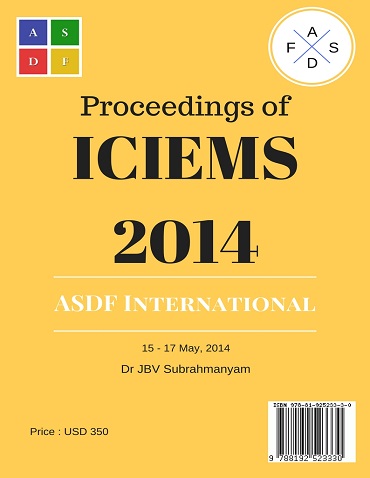- Publication Meta:Value
- Short Title:ICIEMS 2014
- Publisher:ASDF, India
- ISBN 13:978-81-925233-3-0
- ISBN 10:81-925233-3-0
- Language:English
- Type:Hard Bound - Printed Book
- Copyrights:[email protected]
- Editor-in-Chief:JBV Subrahmanyam
- Conference Dates:15 - 17, May 2014
- Venue Country:Hyderabad, India
- Submitted Papers:839
- Acceptance Rate:13.98%
- Website:www.iciems.in
Welcome to ASDF Electronic Digital Library!
ICIEMS 2014
ICIEMS 2014
International Conference on Information Engineering, Management and Security 2014
Paper 032
The Influence of Career and Psychosocial Mentoring on Affective Institutional Commitment, Job commitment and Employee Turnover-With a Focus on IT Employees
Venu Arelly1
1Professor, Department of Humanities and Science, Christu Jyothi Institute of Technology and Science, Jangaon, Warangal, India
Abstract
This study focuses on the relationships between career and psychosocial mentoring, and the employee outcomes of affective institution commitment (AIC), job commitment, and employee turnover. The relationships between psychosocial mentoring and the employee outcomes of AIC and employee turnover were significant. Building from affective events theory, it is found that AIC mediated the relationship between psychosocial mentoring and employee turnover. The study emphasizes the importance of emotion and affect by showing that employees who experienced positive mentoring events at work exhibited higher levels of AIC, which in turn led to reduced employee turnover.
Keywords
Author's Profile
Author profile can be generated and linked through our partners World Book of Researchers. To include your profile online Click Here. After it is approved, please email to edlib @ asdf.res.in to create a link with all the papers.
e-AID
ICIEMS.2014.032
Cite this Article as Follows
Venu Arelly. The Influence of Career and Psychosocial Mentoring on Affective Institutional Commitment, Job commitment and Employee Turnover-With a Focus on IT Employees. International Conference on Information Engineering, Management and Security 2014. Vol. 1. Chennai: Association of Scientists, Developers and Faculties, 2014. 219-224. Print.
© 2010 - by EDLIB .
All Rights Reserved.

